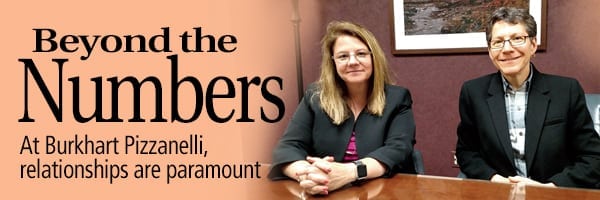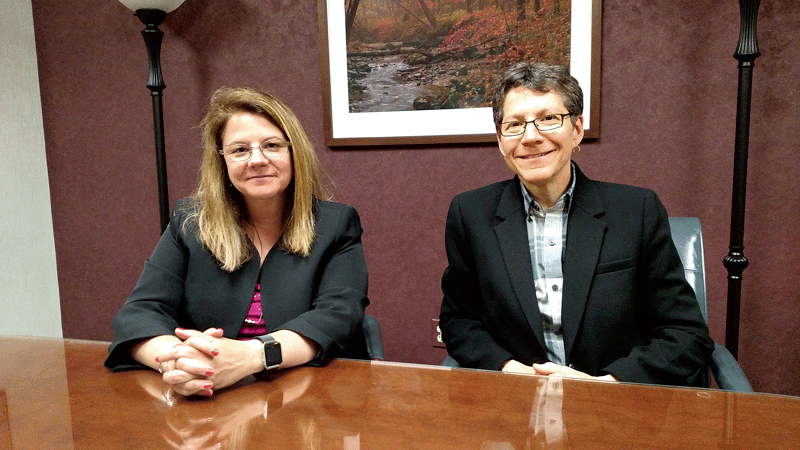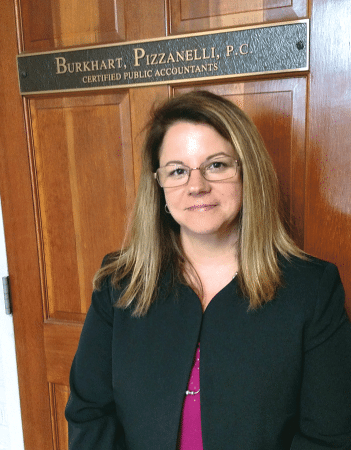
At Burkhart Pizzanelli, Relationships Are Paramount
Beyond the Numbers

Managing Principal Julie Quink, left, and Principal Deborah Penzias
The two youngest partners at Burkhart Pizzanelli say they’ve learned well from the accounting firm’s founders, who have long cultivated a relationship-driven culture that builds not only business, but, more importantly, trust. It’s a model they hope to build upon in the coming decades, with the goal of helping clients navigate the many facets of growing a successful enterprise.
To those outside the accounting industry, it may seem like a dry, numbers-driven game.
But that’s not the case at West Springfield-based Burkhart Pizzanelli, said Managing Principal Julie Quink, noting that each of those numbers tells a story, and it’s a story she and her team want to hear and understand.
“We’re very relationship-driven in terms of our clients, and also with our team — we’re a very close-knit team; that’s how we function,” Quink said. “We don’t want to be one-and-done, where we prepare your tax return and don’t hear from you until next year. We want to reach out often to see how things are going. We want to hear when positive things are happening.”
That leads to new business opportunities, said Partner Deborah Penzias, but also a deepening of trust between Burkhart Pizzanelli and its clients that often results in decades-long business relationships.
“We stress the relationship aspect of it; that’s really important to us,” Quink added. “Our topmost priority here is quality, and building relationships is second.”
The company dates back to 1986, when Richard Burkhart and Salvatore Pizzanelli, still partners with the company today, went into business together as an accounting, tax, and consulting firm. A third partner, Thomas Pratt, joined them soon after, and the three steadily grew the firm. Penzias came on board in 1998, followed by Quink in 2011, and today, the five partners are among 18 total employees, performing services in a variety of areas.
“We provide your traditional tax and accounting services, and we also do a lot of things other firms don’t do,” Quink said. “We have a forensic accounting practice, we have our own bookkeeping group in house, and we have access to a third-party administrator on site who can help with defined-contribution plans and plan design.”
We don’t want to be one-and-done, where we prepare your tax return and don’t hear from you until next year. We want to reach out often to see how things are going. We want to hear when positive things are happening.”
The firm specializes in a number of industry groups, including healthcare, construction, affordable housing, auto dealers, manufacturing, nonprofits, professional services, real estate, restaurants, and wholesale and distribution. “It’s a good mix,” Quink said.
In all those areas, she and Penzias stressed that the company’s culture is one of collaboration, honesty, mutual respect, and trust, and that means forging relationships with all the members of a client’s financial-advisory team, which may include an attorney, an investment adviser, a bank, and an insurance agent. “We’re all part of the financial team advising the business,” Penzias noted.
Whether dealing with a small-business client with $100,000 in revenues or a $100 million entity, that philosophy stays the same, Quink added.
“We like to function as a team. If we find something is not in our bailiwick to deal with, we refer it out. We feel that we should be advising on our core competencies, and if something is outside that realm, we’ll refer it to one of the others on the team. There’s a lot of crossover with legal counsel in terms of estate planning, divorce situations, and business planning. That’s why it’s important for us to work as a team.”
Current Events
It’s equally important to stay on the cutting edge of the accounting and business-advisory world, which Burkhart Pizzanelli does in two critical ways.
“We recently rolled out to the team what our financial picture looks like, where we spend our money,” Quink said. “If you look at it as a pie graph, clearly the biggest piece is our human capital, our people. But the next-biggest buckets where we spend our resources are education and technology.”
“The industry has changed so much since I started in business, when we were preparing tax returns by hand with pen and paper,” Penzias said by way of explaining the commitment to current technology. “That has evolved over the years. Now, we replace our computers on a three-year cycle, whether they need it or not. We’re constantly adding new programs, new tools, so we can delegate the calculation tasks to computers and focus on what’s really important to a business.”

Julie Quink says she sees Burkhart Pizzanelli as a critical part of a client’s financial team.
Quink added that clients are encouraged to use as much technology as possible, both because it creates an electronic trail, and to make their operations as convenient as possible for them. “We’re conscious of the security piece of it, and we’re very secure,” she added.
Burkhart Pizzanelli also invests substantial resources into continuing education, far beyond the minimum requirements of licensing authorities, the partners explained. This includes industry-specific and technical training in the areas in which they operate and want to expand.
Most team members require at least 80 hours of education every two years to retain their certifications, which they usually split into 40 hours each year. But those industry-specific certifications require additional education and may push them well past 60 hours annually.
“The firm pays for this education and makes sure they’re current with what’s happening in different industries, and that we have appropriate knowledge to work in these areas,” said Quink, who became a certified fraud examiner last year. “We should have a working knowledge of any business we’re serving.”
She reiterated that continuing education isn’t just beneficial, but an integral part of the business. “There are certain educational criteria we need to meet. Some folks here have their insurance licenses and are able to help underwrite policies. On the tax side, we need specialized tax knowledge; most of our people here can do tax returns, so the majority of our people get tax training every year to make sure they’re up on their education. We don’t ever want to be in a situation where we’re serving industries we don’t have expertise in.”
Penzias agreed. “We would refer away before doing something we couldn’t handle,” she said, noting that expertise combined with candor helps build trust with clients. “The best referral sources are happy customers.”
The company’s culture is producing happy employees, too, Quink said, noting that more than half of them have been with the firm more than 10 years.
Community Ties
That kind of retention bolsters a relationship-oriented culture that also manifests itself in the community. Many Burkhart Pizzanelli employees volunteer with local organizations in various capacities, including board membership, advising, and other forms of service.
“One thing we stress here is community service,” Quink said. “We encourage the team and provide time during the day or evening to attend events or be involved. We feel like we make a difference in the West Springfield area — both with clients and in our community. We feel it’s important to be a good community partner.”
“We want to give back,” Penzias added, “and we encourage that in our team.”
Meanwhile, the firm continues to expand its reach in professional areas as well. Take Quink’s certification as a forensic accountant, which allows her to work with legal counsel — sometimes on the plaintiff side, sometimes the defense — to help build a case in matters ranging from divorce to business disputes.
“What we don’t do is come up with an opinion on innocence or guilt — just a pattern of facts to help with the case,” she explained. “It’s not just hard numbers; you see what causes people to do things, what motivates them, and it’s often not pleasant for clients because there’s a level of trust that’s been violated, or it may be a marital situation where one spouse is hiding assets from the other. It’s a little more interesting than just doing a tax return.”
The company continues to expand its traditional services as well, now boasting 10 CPAs but also strengthening client relationships on matters from transactional needs to succession planning.
SEE: List of Banks in Western Mass.
“Tom has one client who’s been with him more than 40 years,” Quink said. “They may not need the same level of service anymore, but they stay because of the relationship aspect. They feel comfortable that we’re giving them the best advice for their situation. Clients look to us for advice, and we provide that. If we’re not able to help them with some particular aspect, we refer them to one of the trusted people we deal with.”
As the youngest partners, and the ones who will eventually be fully in charge, Quink and Penzias want that culture to spur the next 30 years of growth at Burkhart Pizzanelli. As a professor at Elms College, Quink has access to a pipeline of talent she can observe and evaluate in the early stages; four of the firm’s employees are Elms graduates.
Counting on Them
In such a diverse business, they added, everything comes back to those relationships they touted multiple times — those real people, with real issues, behind the numbers.
“We’ve seen companies start from seedlings and grow and watch the next generation take over,” Penzias said. “I’ve worked with the parents, and then the kids take over, and we have to foster those relationships as well. It is very gratifying to see our clients succeed.”
But even when they struggle, Burkhart & Pizzanelli has a place — perhaps an even more important one, Quink said.
“When clients aren’t doing so well, I think we shine there,” she said. “We can provide a lot of insight, alternatives, and strategies. At some point in each business’ life cycle, they’ve had some struggles. Most of our clients are closely held, family-run, not publicly traded companies. Family businesses have their own dynamic — and we understand the dynamics of a family business.”
Being there for all aspects of a clients’ business also creates a personal bond as well, Quink said, recalling a client who lost his spouse, and one of the very first calls he made was to Burkhart. “We have so much impact on people’s lives; it’s impressive,” she said. “But, likewise, so is the impact our clients have on our lives.
“As we evolve as a firm, Debbie and I are the future owners; ultimately, she and I will own the firm,” she went on. “With that happening, we are also grooming the next wave. We’re always forward thinking; we’re finding our replacements, too. We’ll be here awhile, but it takes awhile to build referral networks and understand how the business works and really gain experience in the industry. We’re grooming our next leadership team.”
That grooming and training goes far beyond the technical aspects of the accounting industry, Penzias said, but extends to soft skills and relationship building, which are as much art as science, but are critical to continuing the culture first cultivated by the firm’s original partners.
“Trust is important, and relationships are important,” Quink said — much more important, in fact, than the dry numbers on a computer screen.
Joseph Bednar can be reached at [email protected]





